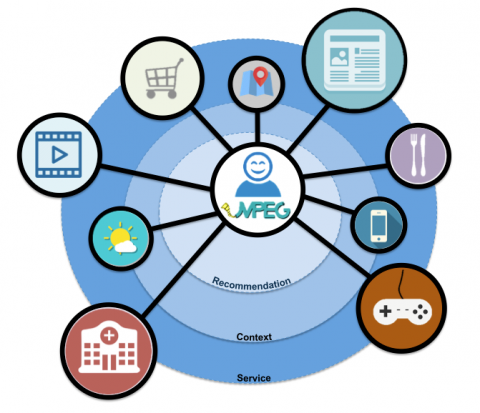
By Philip Merrill - May 2016
The number of online services keeps increasing, and with it the content provided by services, both in titles and variety. The average user is swamped in this ocean of choices and is often frustrated by too many options offered. Hopefully users are already known to some services and can receive personal recommendations from that service. But what about other, potentially interesting services that maybe do not know the user? How is the user going to be made aware of them? And then, even if that is possible, is 1% of a zillion recommendations any better than a zillion pieces of content to choose from?
MPEG-21 User Description (UD) provides a solution to make things better.
By defining a standard format to describe the user, describe the type of service sought and describe the context in which the service will be used, MPEG-21 UD makes it possible to request different Recommendation Services to provide recommendations expressed in a standard format. Recommendations can be processed (compared, filtered etc.) to provide a recommendation short list because they share the same format. Like other parts of MPEG, care was taken to standardize the minimum required, so these four description technologies support a wide range of use cases while remaining application-agnostic. Application providers can leverage these interoperable formats to scale their services in conjunction with other application providers, increasing the market potential for creative partnerships to provide users with high-quality recommendations.
Although public-facing and business-facing entities currently aggregate personal information as a fundamental requirement of their business model, this has been done in an ad hoc manner. The technological opportunism of everybody working separately has helped build the current information ecosystem, which is ripe for an information exchange format to enable intercommunication built on private data, not only for consumer or emergency services but also tied into the emerging Internet of Things. Trade associations presently construct Internet destinations to help users find legal content online, but the power of recommendation can be better set up to thrive. Modeling use cases and requirements, MPEG has found the four metadata descriptions are sufficient to support the desired activity, collectively known as User Description for recommendation engines.
Trade associations and search engines already offer content from competing services side-by-side, but ideally any service could supply appealing responses from multiple other sources. We see some of this in promotional discounts, offers from affiliates and advertising in general, but the marketplace can only respond to the information available to it about the consumer. It would be better if our devices had options to let services know a user's emotional state, physical situation, or past history, and it would be even better if users could negotiate the release of their own records with services that offered to provide benefits in return. Such transparency about private information exchange could unlock economic activity because today's targeted ads and content are not well informed about their users in comparison with what MPEG User Description will enable.
Remaining without interoperable User Descriptions has two immediate drawbacks, maintaining the current status quo in which personal data is aggregated but insufficiently integrated and holding back what could be a successful new type of service, maintaining in-depth private information for users. Some of the major social services authenticate users' logins on third-party sites and can integrate update-postings with content from other sites, but today's experiences of this merely prove the concept. If consumers aggregated their own personal information by means of a personal gateway service, then other players in the ecosystem could receive whatever information was due them or appropriate while the central pile of valuable data plays stand-in within the digital environment for the human being who is its owner. Envisioning comprehensive networks of services such as this is a stretch right now, but it is clear superior preference data and personalization enables better targeting of messages and offers from vendors. Users now decide whether new services can read the contents of their social contacts list, but much more elaborate configurations are possible and could be profitable for all concerned.
From the user's perspective there is much more to be gained than just what to watch or enabling first-responders to access emergency medical records. As interconnected digital devices follow us everywhere, consumers need access to the flexibility and application types that will let them live more effectively, and that means allowing services to access their preferences. With augmented reality and geospatial applications part of the present day, consumers would like services to have ESP about what they want before they want it and how to get where they want to go before they decide where that is. With the MPEG User Description, real progress can be made. Device displays can adjust to light and weather conditions, or switch to wordless visual communication mode. News can be filtered more effectively for both the casual reader and the professional journalist doing research. Translation services and automotive users could add "everywhere" to the applification of "everything." Both group activities and personal shopping would benefit from social sharing of preferences. All it requires is effective interoperable metadata, and fit for purpose MPEG-21 technology has proved ready for the task and is well on its way towards publication as a standard.
Like a boy who wants a robot to be a true friend who knows everything and can do everything, consumer self-interest knows no limits and includes unachievable dreams. Being privileged to access the contents of those personal hopes, selectively and transparently, with mutual consent and automated transactions, should help our collective online digital story unfold in new and more helpful ways.
Go to the MPEG news page
